The Year in Review 2014
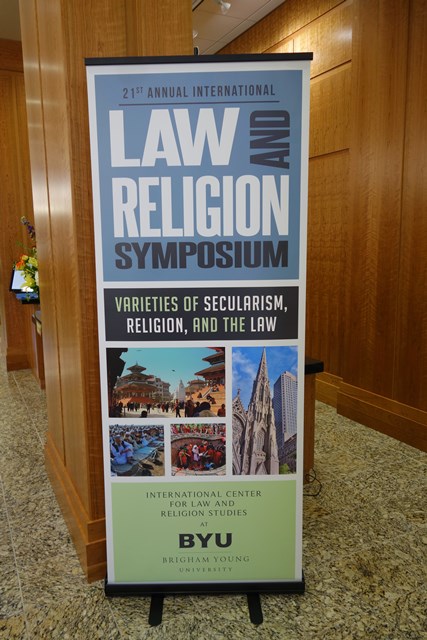
Newsletter 24 December 2014
Dear Friends,
As 2014 comes to a close, we at the International Center for Law and Religion Studies look back on a busy and productive year. We are constantly conscious of how much of our success depends on collaboration with others, particularly those receiving this newsletter, and for that collaboration we express our gratitude. We are working on an annual report for 2014, which will provide a more comprehensive review of activities, but we did not want to let the Christmas and New Year’s season pass without sharing greetings and appreciation.
Most notable as we look back is the impressive series of conferences in which the Center has participated, often as a co-sponsor. In addition to our annual International Law and Religion Symposium in Provo, we participated in or co-organized more than twenty-five other conferences this year. These included conferences held on every continent except Antarctica. Particularly significant…
Freedom of Religion Is Topic of UN Side Event, October 2014
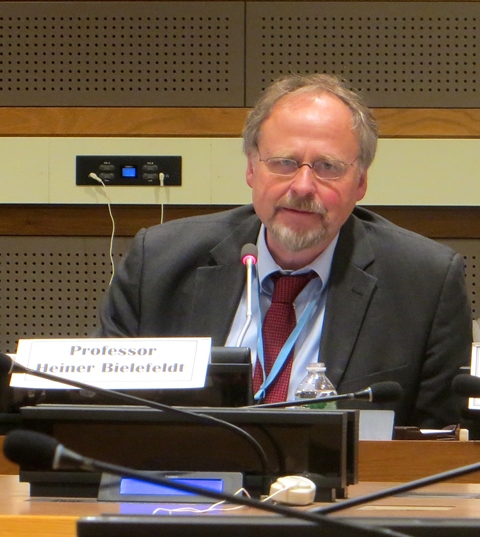
Report by Laurie Williams Sowby, Deseret News, October 31
It began with a Jewish piano teacher who was dismissed from her job at a European music conservatory because she refused to give exams on Saturdays, the day she honored as the Sabbath. When he heard of the case, Professor Heiner Bielefeldt knew religious freedom in the workplace was an issue he wanted to pursue. Dr. Bielefeldt, human rights professor at the University of Erlangen-Nürnburg in Germany, was appointed as U.N. Special Rapporteur on Freedom of Religion or Belief in 2010 with a three-year renewal of his appointment in 2013. He presented his report at the United Nations Oct. 23 and headed panels on the topic Oct. 23 and 24 in New York.
The U.N. side event on Oct. 24, co-hosted by the United Kingdom and BYU’s International Center for Law and Religion Studies, featured several noted authorities in the field. The session was attended by 60 people, including diplomats from missions to the U.N. and representatives from…
Freedom of religion is topic of U.N. side event
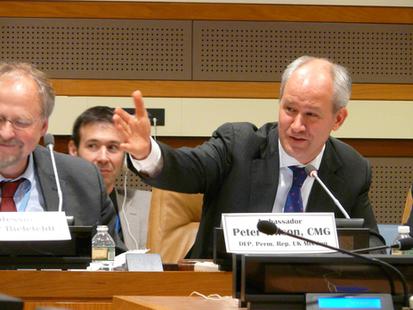
New York City, October 24, 2014
Laurie Williams Sowby, Deseret News
It began with a Jewish piano teacher who was dismissed from her job at a European music conservatory because she refused to give exams on Saturdays, the day she honored as the Sabbath. When he heard of the case, Professor Heiner Bielefeldt knew religious freedom in the workplace was an issue he wanted to pursue.
Dr. Bielefeldt, human rights professor at the University of Erlangen-Nürnburg in Germany, was appointed as U.N. Special Rapporteur on Freedom of Religion or Belief in 2010 with a three-year renewal of his appointment in 2013. He presented his report at the United Nations Oct. 23 and headed panels on the topic Oct. 23 and 24 in New York.
The U.N. side event on Oct. 24, co-hosted by the United Kingdom and BYU’s International Center for Law and Religion Studies, featured several noted authorities in the field. The session was attended by 60 people, including diplomats from missions to the U.N. and representatives from non-governmental agencies interested in fostering religious freedom globally.
W. Cole Durham Jr., who heads BYU’s International Center for Law and Religion Studies, assembled the panel of experts. The interactive session responding to Dr. Bielefeldt’s report on religious freedom in the workplace was moderated by Peter Wilson, CMG, Ambassador and Deputy Permanent Representative for the U.K. Mission to the United Nations. He explained that the workplace must be included as part of a person’s life and identity, as far as definitions of human rights go.
Although religious freedom is one of the oldest mandates in the U.N., Dr. Bielefeldt said it has not received as much attention as many other mandates, and more needs to be done to prevent and eliminate religious intolerance and discrimination in the workplace. Employers should “generally understand religious tolerance and diversity as a positive asset and important part of their corporate identity.”
“Equality is not sameness,” he emphasized. “It means equal respect for people’s beliefs.”
He and other panelists encouraged “reasonable accommodation” on the part of employers, including areas of religious dress, practice and holidays. “In the context of human rights,” he said, “equality must always be conceived of as diversity-friendly equality, which is the opposite of ‘sameness’ or uniformity.”
Lucy Vickers, a professor of law at Oxford Brookes University in England, noted that work is not a private space and, at times, becomes a place of both direct and indirect religious discrimination.
Todd R. McFarland, associate general counsel for the General Conference of Seventh-day Adventists, echoed the sentiment, saying people should not have to “choose between living their religion and making a living.” He continued, “Equality doesn’t mean sameness. It means you treat people as individuals.”
Recognizing that religion and belief are an integral part of every human being, Richard Foltin, director of the American Jewish Committee’s National and Legislative Affairs, put it this way: “We cannot expect people to leave their religion at the door of the workplace.”
Panelists agreed with Dr. Bielefeldt’s recommendations and urged the international human rights community to take religious freedom seriously. “This report was a step forward to strengthen this position on the ground,” said Dr. Peter Petkoff, who leads the Religion, Law, and International Relations Programme of Regent’s Park College in Oxford, England.
Translating ideas into practice is the next step. Katie Alidade, Ph.D. candidate at Catholic University of Leuven, in Belgium, was a key researcher in the Religare project, which studied cases of religious discrimination in the workplace in 10 European countries. Rather than see religion or belief as an exception, her report recommended employers need to adopt policies of “inclusive neutrality.”
BYU’s Professor Durham said Dr. Bielefeldt’s report “helps to remind us that we live in a world with deep difference, in which peace can only be grounded on an obligation to respect everyone else’s existential choices, within the limits of optimal equal liberty for all.”
In a question-and-answer session, he encouraged the support of faith and belief throughout the world, saying, “Some of our greatest good has been accomplished by people who asserted their conscience.”
Intensive Master Level Course in Yogyakarta : Sharia and Human Rights: Scholarly Background and Cases of Controversy in Contemporary Indonesia – 2014
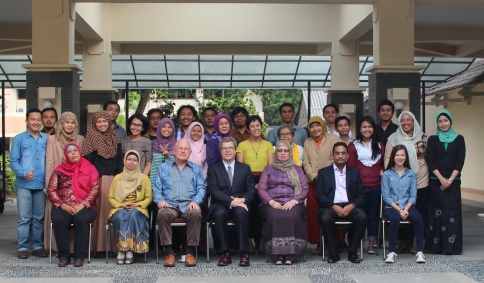
Professor Brett G. Scharffs, Associate Dean for Faculty and Curriculum, Francis R. Kirkham Professor of Law, and Associate Director of the International Center for Law and Religion Studies at BYU Law School, participated in an Intensive Master Level Course on Sharia and Human Rights: Scholarly Background and Cases of Controversy in Contemporary Indonesia, held in Yogyakarta, Indonesia, 2-6 June 2014. The event was co-sponsored by the International Center for Law and Religion Studies, the Oslo Coalition on Freedom of Religion or Belief, and the Faculty of Law, Universitas Gadjah Mada…
The Center in Latin America 2014: Mark-up Session in the Dominican Republic
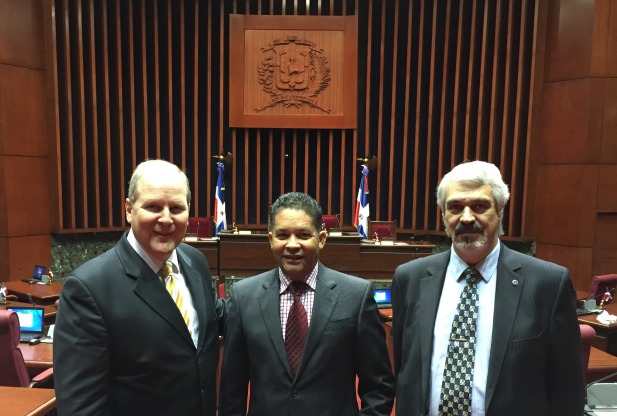
Professor Gary Doxey, Associate Director of the International Center for Law and Religion Studies, along with the Center’s long-time colleague and Academic Advisory Board Member from Argentina, Juan Navarro Floria, were invited as outside experts to attend a mark-up session of a comprehensive new bill regarding religious organizations that is before the National Congress of the Dominican Republic.
Also in 2014, the Center assisted with legislation in Costa Rica and Bolivia and provided research for a brief submitted to the Constitutional Court of Colombia.
Symposium 2014: Senator Hatch Receives Distinguished Service Award
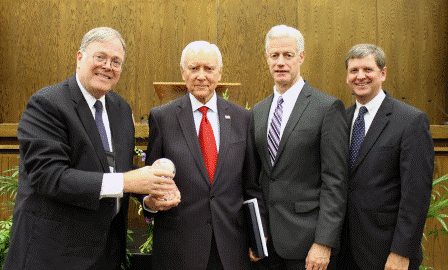
The 21st Annual International Law and Religion Symposium opened on Sunday evening, October 5, 2014, in the Moot Court Room of the J. Reuben Clark Law School on the campus of Brigham Young University in Provo, Utah. Those in attendance and listening in via live webinar were welcomed by Law School Dean James R. Rasband and Brigham Young University President Kevin J Worthen. Professor W. Cole Durham, Jr., Director of the Symposium’s sponsoring organization, the International Center for Law and Religion Studies, presented the Center’s Distinguished Service Award to Senator Orrin Hatch (R-Utah), who…
Symposium 2014: “Varieties of Secularism, Religion, and the Law”
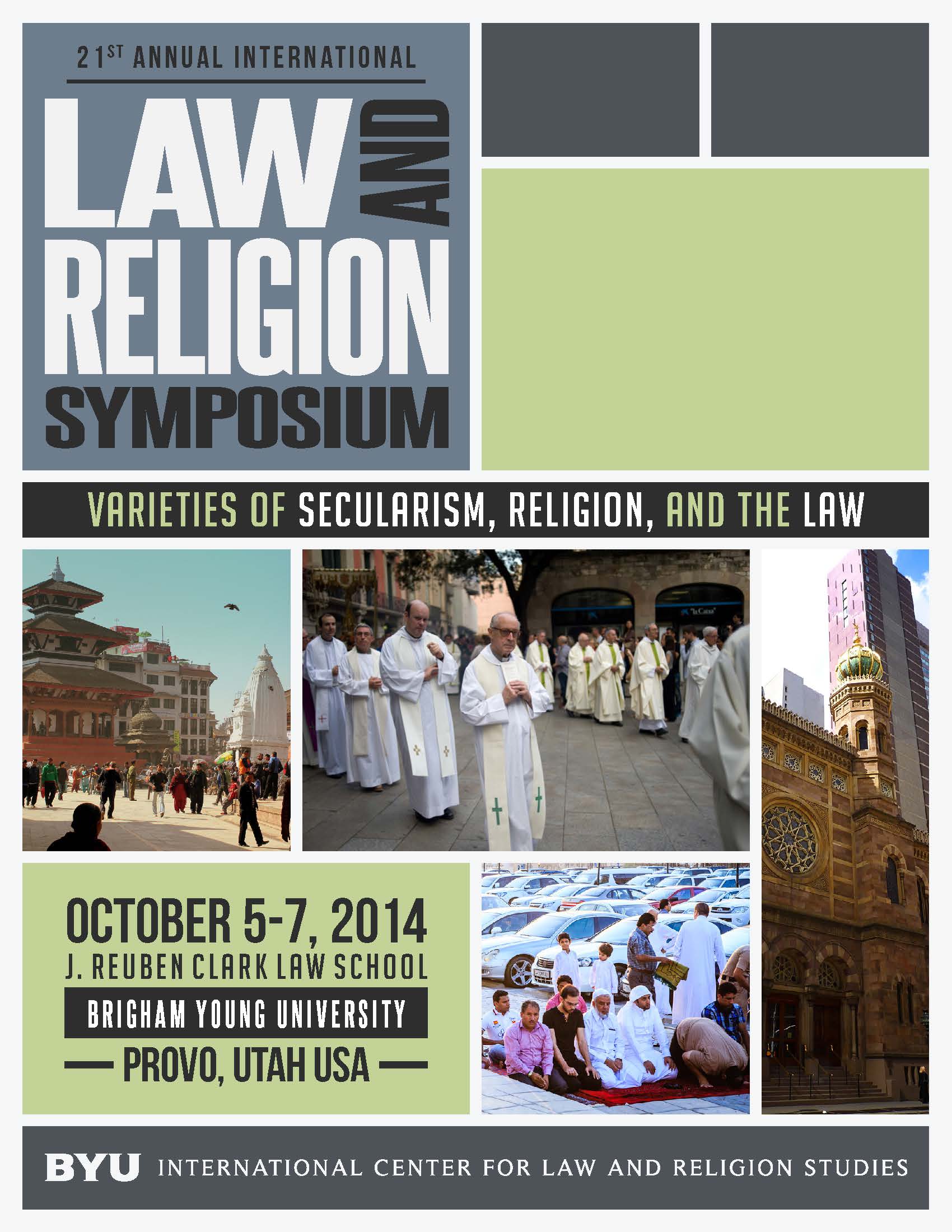
The 21st annual International Law and Religion Symposium, this year featuring 80 invited delegates, from 40 countries, addressed the theme “Varieties of Secularism, Religion, and the Law.” The Symposium opened Sunday evening, 5 October, with welcoming remarks by BYU Law School Dean, James R. Rasband, and President of Brigham Young University, Kevin J Worthen. The Keynote Address was given by United States Senator for Utah Orrin Hatch, who also was presented with the Center’s Distinguished Service Award, by Professor W Cole Durham, Jr., Director of the International Center for Law and Religion Studies.
This year’s delegates included scholars, government officials, journalists, and religious and civic leaders from Argentina, Armenia, Australia, Brazil, Canada, China, Croatia, Democratic Republic of Congo, Dominican Republic, France, Greece, Guatemala, Guyana, Hungary, India, Indonesia, Israel, Italy, Japan, Laos, Malaysia, Mexico, Mongolia, Nigeria, Norway, Paraguay, Peru, Philippines, Poland, Russia, Singapore, Slovakia, South Korea, Spain, Turkey, Ukraine, United Kingdom, United…
Robert Smith Testifies before Congress on Protecting International Religious Freedom
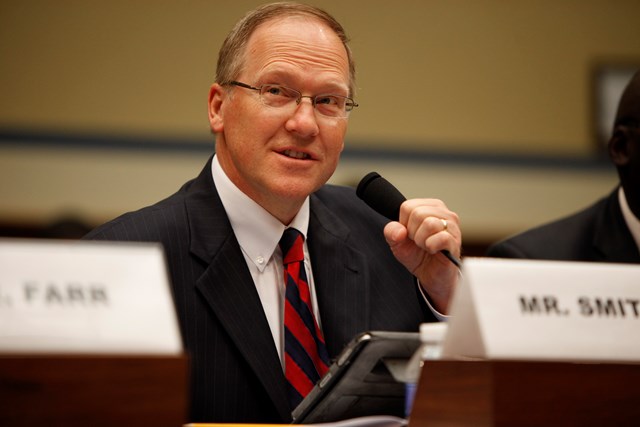
Thanks to the BYU Law School News Team for content of this article
Robert T. Smith, Managing Director of the International Center for Law and Religion Studies, testified on 18 September 2014 before the US House of Representatives Committee on Oversight & Government Reform on the topic “Protecting International Freedom.” Mr. Smith’s testimony specifically addressed ways to improve international religious freedom through better implementation of the 1998 International Religious Freedom Act. With international tensions running high due to violence…
Center Honors Students for Extraordinary Service
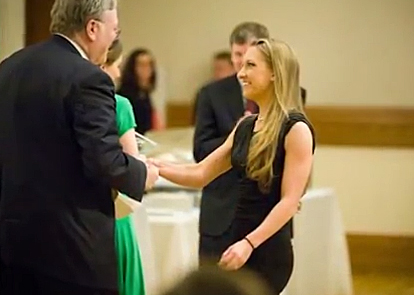
The International Center for Law and Religion Studies was pleased to present awards to ten outstanding students from the J. Reuben Clark Law School on March 26, 2014, at the Law School’s annual Barrister’s Ball.
Receiving Meritorius Service Awards for a variety of contributions to the work of the Center were Michelle Jeffs, Carl Hollan, and Eimi Priddis. Outstanding Service Awards, recognizing three years of service to the annual International Law and Religion Symposium were presented to Cherise Bacalski, Jorge Gavilanes, Erica Berrett, Natalia Peterson, Joshua Bishop, Daniel Scow, Kia Hohaia, Michelle Jeffs, and Eimi Priddis.
Dean Brett Scharffs’ World of Law Lecture: Religious Freedom
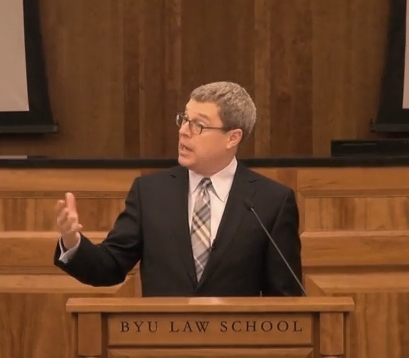
On 5 March 2014, Dean Brett G. Scharffs presented the fifth and final lecture in the BYU Law School’s 2014 World of Law brown bag series, designed to give undergraduate students the opportunity to hear top legal scholars from BYU Law School address critical issues in the world. Dean Scharffs, who is Francis R. Kirkham Professor of Law as well as Associate Dean of the Law School and Associate Director of the International Center for Law and Religion Studies, spoke on Religious Freedom, outlining three ways that law students help with this important work:
- Learning: Classes and seminars on US and international freedom of religion.
- Advocacy: Opportunities to work on Supreme Court briefs in pending
…
Durham Keynotes Conference: Promoting the Freedom of Religion and Beliefs in ASEAN

Professor W. Cole Durham, Jr., Director of the International Center for Law and Religion Studies, was the keynote speaker at a Regional Consultation on Promoting the Freedom of Religion or Belief in ASEAN in Jakarta, Indonesia, from 19-20 February 2014. The event was hosted by HRWG – Human Rights Working Group, a Coalition of Indonesian NGOs for International Human Rights Advocacy, in partnership with the Indonesian Representative for AICHR, Mr. Rafendi Djamin, and supported by the Canadian Government. Participants included members of AICHR, ACWC, representatives of relevant governmental agencies from ASEAN Member States, National Human Rights Institutions (NHRI’s) from Indonesia and the Philippines, Think Tanks and academes, Human Rights NGOs, interfaith dialogue organizations, and religious organization from several ASEAN Member States and representatives from the diplomatic community in Jakarta….
A Quiet Voice in a World of Trouble, Cole Durham Works for Religious Liberty
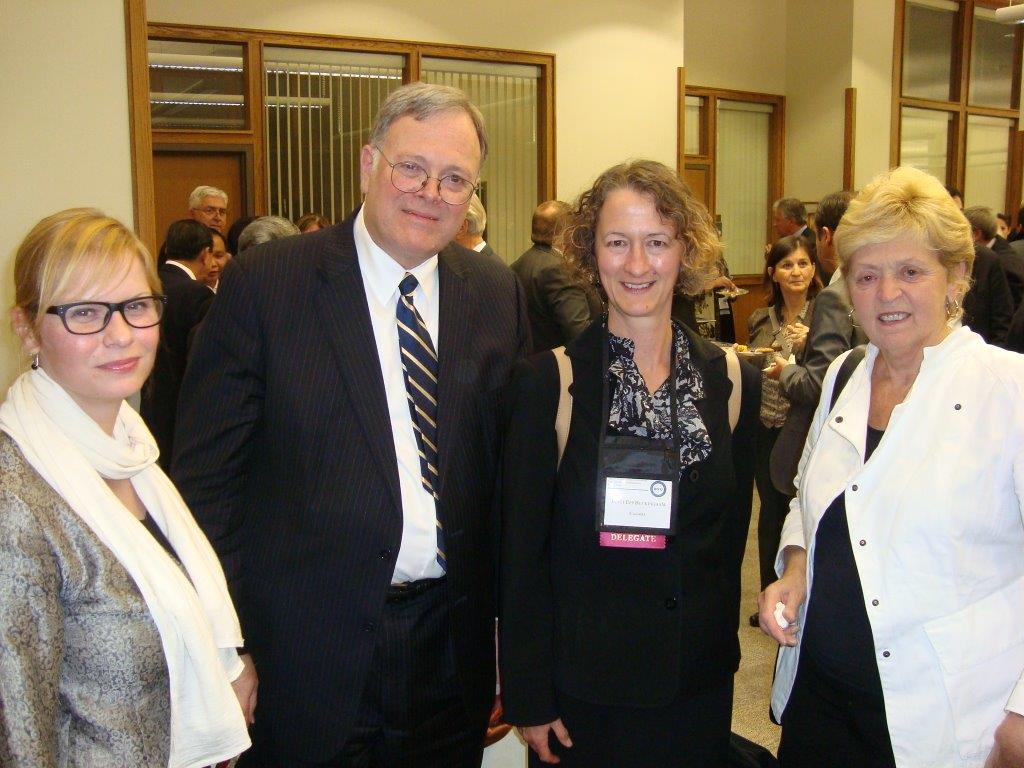
Eric Schulzke, Deseret News – 9 January 2014
In a crowded, wood-paneled mock courtroom at a recent conference on religious liberty in Provo, delegates from 40 countries listened intently through their headphones as translators scrambled to integrate 15 languages, ranging from Macedonian to Vietnamese.
At the podium, a South African judge told how he twice overruled parental religious objections, forcing them to allow their child a blood transfusion. “I think in both cases the parents were eventually happy that their children survived,” he said.
A Malaysian lawyer later stood to condemn any religious influence in public life. “Human rights is the enemy of all religions,” he said, his perspective bent under the weight of a heavy-handed Muslim majority at home. “Human rights stem from…